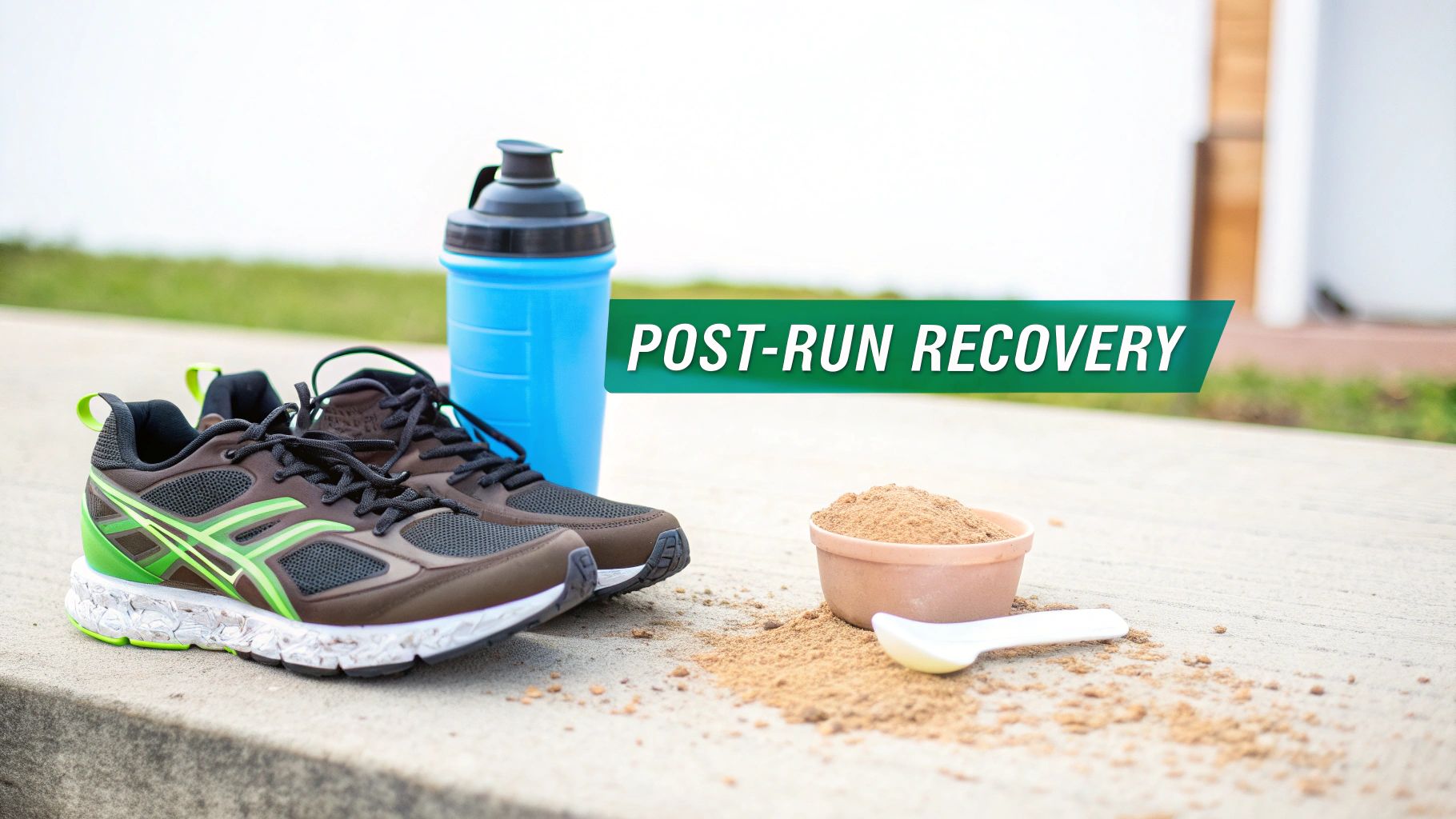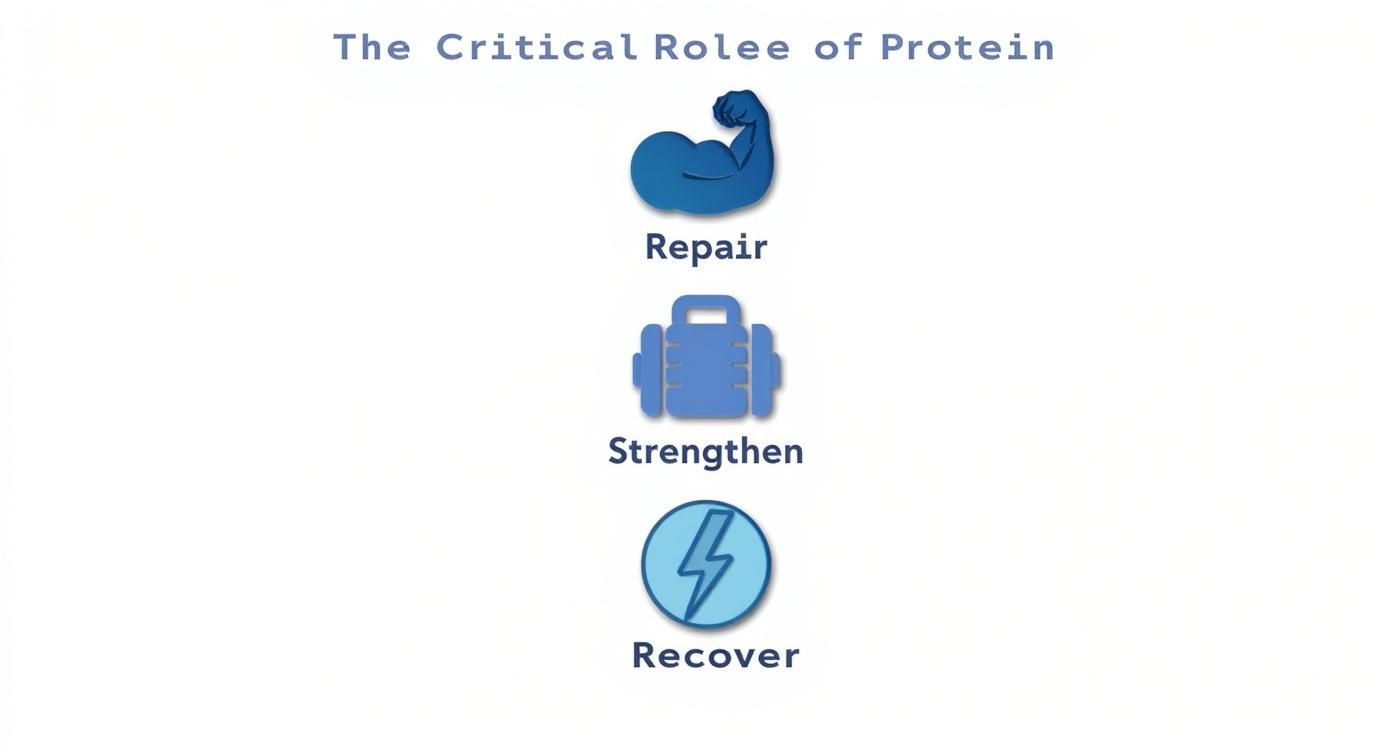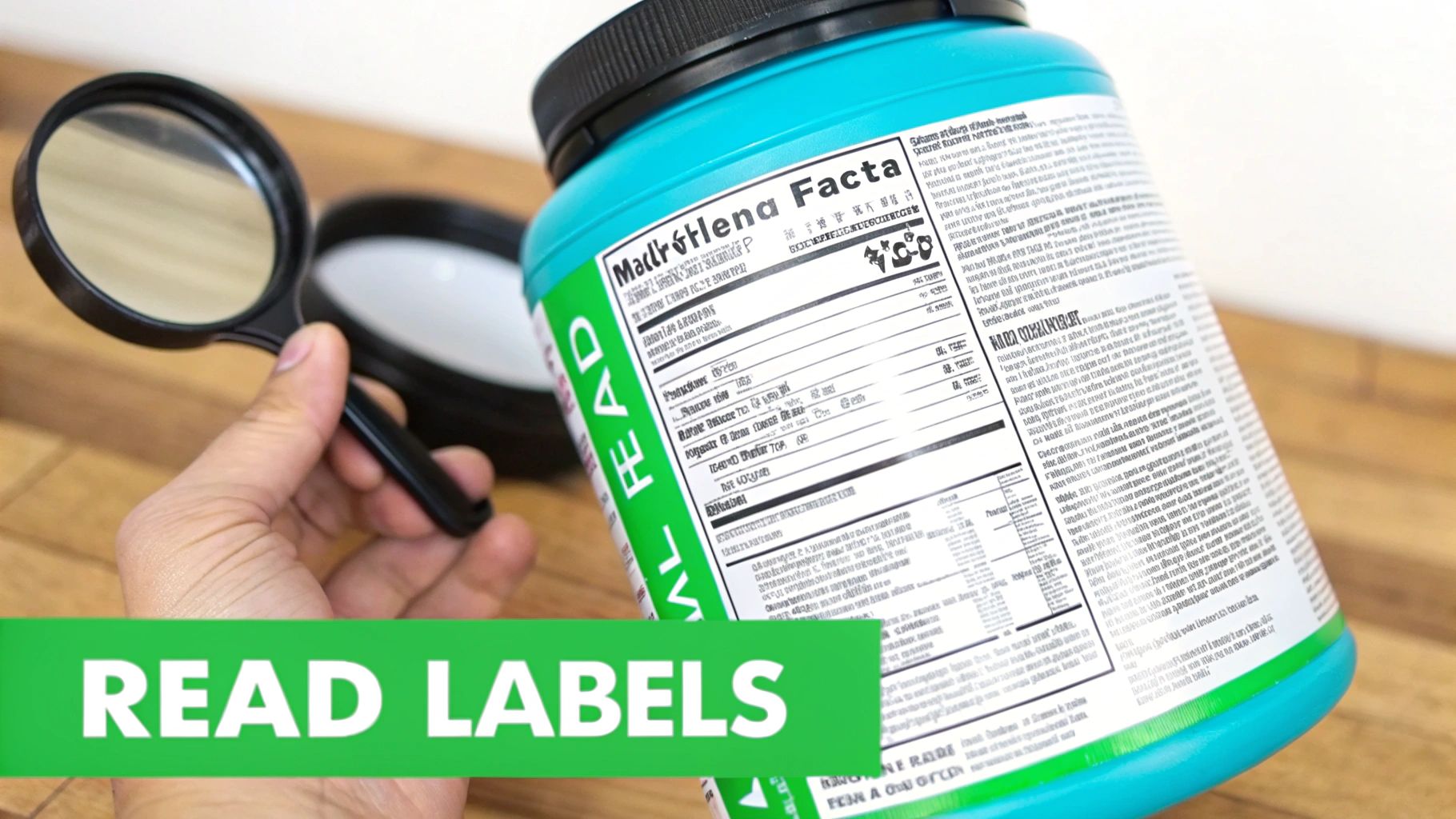If you're looking for the short answer, whey isolate is tough to beat for immediate post-run recovery, thanks to its lightning-fast absorption and high BCAA content. But for runners with sensitive stomachs or dietary restrictions, a quality plant-based blend (think pea and rice) is a fantastic alternative that delivers serious recovery power.
Finding the Right Protein Powder for Your Run

Stepping into the supplement aisle can feel like a pop quiz you didn't study for. But zeroing in on the right protein powder can make a world of difference in your recovery, strength, and overall performance on the road or trail.
Think of protein as the dedicated repair crew for your muscles. After a hard run, your muscle fibers are riddled with tiny micro-tears. Protein swoops in with the amino acids—the building blocks—needed to patch them up, making them stronger for your next workout. This guide cuts through the noise and focuses on what actually matters for runners.
What Runners Should Look For
Choosing the right protein powder isn't about flashy labels; it's about understanding how a protein actually works inside your body after you log those miles. A few core concepts will help you make a smarter choice.
Here’s what really separates one tub from another:
- Absorption Speed: This is all about timing. How quickly can those amino acids get to your tired muscles to kickstart the repair process? Faster is better right after a run.
- Amino Acid Profile: You're looking for a "complete" protein. That means it has all nine essential amino acids, especially a high amount of leucine, the key amino acid that flips the switch for muscle protein synthesis.
- Digestibility: The last thing you want after a tough workout is a protein powder that sits like a rock in your stomach. A good powder should be gentle on your system, which can already be sensitive post-run.
It's no surprise that the global protein powder market, valued at around USD 28.8 billion in 2025, is expected to surge to nearly USD 59.9 billion by 2035. More athletes than ever recognize that protein is a cornerstone of effective muscle repair and endurance.
Protein Powder at a Glance for Runners
To give you a clear starting point, the table below breaks down the top protein types and shows where they shine for a runner. This is a quick-hit guide to help you match the right protein to your specific needs.
Of course, protein is just one piece of the puzzle. Your overall energy intake is critical, too. You can figure out your daily requirements using our comprehensive running calorie calculator.
| Protein Type | Optimal Use Case | Absorption Rate | Key Running Benefit |
|---|---|---|---|
| Whey Isolate | Immediately after any run, especially intense workouts or long runs. | Very Fast | Rapid muscle repair and reduced soreness due to high leucine content. |
| Whey Concentrate | General post-run recovery for runners on a budget. | Fast | A cost-effective complete protein that supports muscle maintenance. |
| Casein | Before bed to support overnight muscle repair and growth. | Very Slow | Provides a steady, sustained release of amino acids to prevent muscle breakdown. |
| Plant-Based Blends | Post-run recovery for vegan athletes or those with dairy sensitivities. | Moderate to Fast | Offers a complete amino acid profile from multiple sources, ensuring effective recovery. |
This table serves as a great cheat sheet, but we'll dive deeper into each of these to give you the full picture and help you make the best call for your training.
Why Protein Is So Important for Runners
When most people hear "protein powder," they picture bodybuilders, not marathoners. But for any runner serious about their mileage, protein isn't just about building bulk—it's the bedrock of endurance, resilience, and repair. Getting a handle on its role is your first step toward unlocking better recovery and stronger performances.
Every run you go on creates tiny, microscopic tears in your muscle fibers. This isn't a bad thing; it's a normal part of training called exercise-induced muscle damage. It’s the very signal that tells your body it's time to adapt and get stronger. But if you don't give your body the right tools to fix the damage, you're just left with soreness, fatigue, and a greater chance of getting injured.
The Real Work: Muscle Repair and Adaptation
This is where protein comes in. It provides the essential amino acids—the literal building blocks—your body needs to patch up those micro-tears. Think of it as a repair crew showing up after a storm. Without the crew and their materials (the amino acids), the damage just sits there. Getting enough protein ensures that crew is always on call to rebuild your muscles, making them stronger and more prepared for your next workout.
This constant cycle of breakdown and repair is precisely how you build endurance. It’s what lets you take on higher training loads, push for longer distances, and bounce back faster between your runs.
The magic isn't in the run itself, but in the recovery that follows. Protein is the catalyst that transforms the stress of a tough workout into real, tangible gains in strength and endurance.
This process is vital whether you're just adding a few miles to your week or following a structured plan for a big race. In fact, if you're tackling longer distances, dialing in your recovery fuel is a massive piece of the puzzle. For more on that, you can check out our in-depth guide on how to train for a half marathon.
More Than Just Muscles: Protein's Full-Body Impact
While muscle repair grabs all the headlines, protein's job in a runner's body goes much deeper. It’s involved in just about every system that keeps you going, mile after mile.
Here’s a quick look at its other critical roles:
- Hormones & Enzymes: Protein is needed to produce the enzymes that break down carbs and fat for energy. It also helps create the hormones that regulate your mood, energy, and overall metabolic balance.
- A Stronger Immune System: Let's be honest, long-distance training can beat up your immune system, leaving you vulnerable to getting sick. Protein helps build the antibodies and immune cells that act as your body's defense force, keeping you healthy enough to stick to your training plan.
- Oxygen Delivery: You can't run without oxygen. Hemoglobin, the protein in red blood cells that carries oxygen to your muscles, can't be made without a steady supply of dietary protein. Better oxygen delivery means better aerobic performance and less fatigue.
Ultimately, getting enough protein is one of your best defenses against the dreaded signs of overtraining. By supporting muscle repair, keeping your immune system robust, and regulating key metabolic functions, it helps your body keep up with the demands of running. Skimping on this nutrient is one of the fastest ways to hit a wall in your training.
Comparing Protein Powders for Runners
Picking the right protein powder can feel more complicated than mapping out a new running route. With shelves overflowing with tubs all screaming marketing claims, it’s easy to feel lost. But here’s the secret: the decision gets a lot simpler when you match the right protein to your specific running needs.
Not all proteins behave the same way, especially when you factor in the unique demands of running. The real differences come down to how fast your body absorbs them, their amino acid profile, and, crucially, how well they sit in your stomach after a tough workout. Let's break down the main players—whey, casein, and plant-based blends—to see where each one fits in a runner's toolkit.
This infographic cuts through the noise, showing why protein is a non-negotiable part of your running nutrition. It highlights its core jobs: repair, strength, and recovery.

As you can see, these benefits are all connected. They work together to turn the physical stress of training into real, measurable performance improvements.
Whey Protein: The Gold Standard for Post-Run Recovery
Whey protein has earned its reputation as the champion of post-workout recovery, and for good reason. It's a milk-derived complete protein packed with branched-chain amino acids (BCAAs), especially leucine. Think of leucine as the ignition switch for muscle protein synthesis—the biological process that repairs and rebuilds your taxed muscle fibers.
It’s no surprise that whey still dominates the market. Its high bioavailability and rapid absorption are exactly what a runner’s body craves after a hard effort. In 2024, whey accounted for roughly 38.6% of the global protein powder market, leading all other types. You can dig into the full protein powder market analysis to see more on these trends.
But "whey" isn't just one thing. It comes in two primary forms, each with a slightly different job to do.
Whey Isolate
Whey isolate is the fast-acting, purified version. It goes through extra filtering to strip out most of the lactose, fat, and carbs, leaving a product that’s typically 90% or more protein by weight.
This purity means it hits your system incredibly fast, making it the perfect choice for that critical 30-to-60-minute recovery window after a brutal run. Because it has almost no lactose, it’s also a much safer bet for runners who get stomach issues from other dairy products.
Best For:
- Immediately after intense speed work, long runs, or races.
- Runners sensitive to lactose who still want the performance benefits of whey.
- Athletes zeroed in on lean muscle repair without any extra calories.
Whey Concentrate
Whey concentrate is the less-processed sibling of isolate. It has a bit more fat and lactose, and its protein content usually lands between 70-80%. It digests a little slower than isolate, but it’s still considered a fast-acting protein.
The biggest plus for whey concentrate? The price. It delivers a fantastic, complete protein source that’s much friendlier on the wallet, making it a great all-around option for daily training.
Best For:
- General post-run recovery after everyday training runs.
- Runners on a budget who have no issues with dairy.
- Shakes and smoothies where a slightly creamier texture is a bonus.
The Bottom Line: For a marathoner who just finished a grueling 20-miler, whey isolate is the clear winner. Its lightning-fast delivery of BCAAs to damaged muscle fibers jump-starts the repair process when your body is most ready for it, helping to curb soreness and get you back on your feet for the next workout.
Casein Protein: The Overnight Repair Specialist
Casein is the other major protein in milk, making up about 80% of the total. Its defining feature is its incredibly slow digestion speed. When casein hits your stomach, it forms a gel, leading to a slow, sustained release of amino acids into your bloodstream over several hours.
This "drip-feed" effect makes casein a poor choice right after a run when your muscles are screaming for immediate fuel. However, that same slow-release property makes it an absolute powerhouse for preventing muscle breakdown during long stretches without food—like when you're sleeping.
Taking casein before bed gives your body a steady supply of building blocks to repair muscle tissue all night long. This maximizes your recovery during that crucial rest period.
Best For:
- A pre-bedtime shake to fuel overnight muscle repair.
- Runners in a heavy training block who need to maximize every minute of recovery.
- A satiating protein source to keep you full between meals.
Plant-Based Protein Blends: The Versatile Alternative
Plant-based proteins have improved dramatically over the years. A decade ago, most were incomplete (lacking one or more essential amino acids), but today's blends are a different story. By combining multiple sources, they now offer a complete and powerful amino acid profile.
You'll often see pea and rice protein blended together, a combination that creates a full amino acid spectrum that rivals whey. These are fantastic options for vegan runners, of course, but also for anyone with dairy allergies or intolerances.
Digestion speed for plant blends usually falls in the middle—slower than whey isolate but faster than casein—making them a solid, versatile choice for post-run recovery. The best ones on the market also include digestive enzymes to boost absorption and sidestep the bloating some people experience.
Best For:
- Vegan runners or anyone with dairy or soy allergies.
- Runners who find whey causes them digestive issues.
- Anyone looking to add more high-quality, plant-based nutrition to their diet.
In-Depth Protein Powder Comparison for Runners
To make the choice even clearer, this table breaks down how each protein source stacks up against the specific demands of a runner's body.
| Attribute | Whey Isolate | Whey Concentrate | Casein | Plant-Based Blend |
|---|---|---|---|---|
| Digestion Speed | Very Fast. Ideal for the immediate post-run window. | Fast. Great for general post-run recovery. | Very Slow. Best for sustained release (e.g., overnight). | Moderate. A versatile option for post-run shakes. |
| Primary Use Case | Immediate Recovery: Post-speedwork, long runs, or races. | Daily Recovery: Cost-effective choice for consistent training. | Overnight Repair: Prevents muscle breakdown during sleep. | All-Purpose: Suits dairy-free/vegan athletes and general use. |
| Protein Purity | Highest (90%+) Minimal carbs, fats, and lactose. | High (70-80%) Contains some carbs and lactose. | High (80%+) Slow-digesting protein clumps. | Varies (70-85%) Purity depends on the sources used. |
| Lactose Content | Very Low/None. Usually well-tolerated by sensitive individuals. | Moderate. Can cause issues for lactose-intolerant runners. | High. Avoid if you have a significant lactose intolerance. | None. Naturally dairy-free and lactose-free. |
| Best For… | The serious runner prioritizing rapid, lean muscle repair. | The budget-conscious runner needing a solid daily protein. | The dedicated athlete looking to maximize overnight recovery. | The vegan or dairy-sensitive runner needing a reliable alternative. |
Ultimately, the "best" protein is the one that fits your body, your training, and your lifestyle. Many experienced runners even keep both a fast-acting whey or plant blend and a slow-acting casein on hand to cover all their recovery needs.
How to Decode a Protein Powder Label

The front of a protein tub is all marketing—it's designed to sell you a story. The real truth, however, is always on the back. If you want to find the best protein powder for your running, the single most important skill you can develop is learning to read a nutrition label. It’s how you cut through the hype and choose a product that actually works.
Forget the flashy promises of "insane recovery" or "explosive gains." Just flip the container over and focus on the fundamentals. Start with the serving size, protein content, and carbohydrate count. These three numbers are the foundation of your decision.
Mastering the Ingredient List
The ingredient list is where brands often hide their secrets. Ingredients are always listed by weight, from most to least, so the first few items on the list tell you almost everything you need to know about the product's quality. A clean, effective protein powder for a runner should have a short list.
Ideally, the protein source itself—whether it's whey protein isolate, pea protein, or a plant blend—should be the very first thing listed. If you see sugar, a filler, or anything else in that top spot, put it back on the shelf. That’s a huge red flag that the product is more fluff than fuel.
Keep an eye out for these common offenders:
- Fillers and Thickeners: Ingredients like maltodextrin, psyllium husk, or gums (xanthan, guar) are cheap additives used to create a thicker texture and add bulk. They offer zero performance benefits and can cause digestive issues for some runners, which is the last thing you want on a run.
- Artificial Sweeteners: Sucralose, aspartame, and acesulfame potassium are everywhere. While some people tolerate them just fine, many runners find they cause bloating or leave a lingering, chemical aftertaste. Natural sweeteners like stevia or monk fruit are often a much better bet.
- Proprietary Blends: Be very skeptical of "proprietary blends." This is a labeling trick that lets companies group ingredients together without telling you how much of each is included. You have no idea if you're getting an effective dose of the good stuff or just a tiny, ineffective sprinkle.
A truly high-quality protein powder has nothing to hide. The ingredient list should be short, simple, and easy to understand, with the protein source leading the way.
The Importance of Third-Party Certifications
For any runner who competes, what's not in your protein powder is just as critical as what is. The supplement industry isn't as tightly regulated as most people think, meaning a product could be contaminated with substances banned in competition.
This is where third-party certifications are non-negotiable. These independent organizations test supplements to verify their purity, potency, and safety. To make sure your powder is clean, look for one of these logos on the label.
Key Certifications to Trust:
- NSF Certified for Sport: This is the gold standard. It verifies that what's on the label is actually in the tub, tests for contaminants, and certifies that the product is free of more than 270 substances banned by major athletic organizations.
- Informed-Choice / Informed-Sport: This is another highly respected global program that tests every batch of a supplement for banned substances before it’s released to the market. Seeing this logo provides peace of mind that you're safe to compete.
Opting for a certified product is the smartest move you can make to protect both your health and your eligibility. It ensures you’re getting a safe, effective recovery tool, not a potential liability.
Matching Your Protein Strategy to Your Training
Knowing the difference between protein powders is a great start, but the real magic happens when you nail when and why to use them based on your actual training. A marathoner grinding through long, slow miles has completely different recovery needs than a sprinter building explosive power. Syncing your protein intake with your workouts isn't a minor detail—it's the key to consistent, injury-free progress.
Think of your protein shake less as a generic recovery drink and more as a precision tool. A casual 3-mile jog simply doesn’t demand the same nutritional response as a grueling 20-mile marathon simulation. The goal is to match the intensity and duration of your run with a smart, targeted protein plan that gives your body exactly what it needs, right when it needs it.
Your Post-Run Recovery Shake
The most critical time to reach for a protein shake is within the 30-60 minutes after a tough run. This is often called the "anabolic window," a period when your muscles are incredibly receptive to nutrients and are primed to kickstart the repair process. The goal here is all about speed, making a fast-acting protein the perfect fit.
For this job, your shake needs to do two things: repair muscle tissue and restock your energy stores.
- Protein for Repair: A scoop of a fast-absorbing whey isolate or a high-quality plant-based blend (like pea and rice) delivers the essential amino acids needed to patch up the micro-tears in your muscles. Aim for 20-30 grams of protein to effectively trigger what’s known as muscle protein synthesis.
- Carbs for Refueling: Protein doesn't work in a vacuum; it’s far more effective when paired with carbohydrates. Carbs get to work replenishing your depleted glycogen (your muscles' main fuel source) and create a small insulin response, which actually helps shuttle amino acids into your muscle cells more efficiently. A 3:1 or 4:1 carb-to-protein ratio is the classic gold standard for endurance recovery.
Example: The Ultimate Post-Long Run Shake
This simple recipe is built for one thing: maximum recovery after a hard effort.
- 1 scoop whey isolate or plant-based protein powder (about 25g protein)
- 1 large banana (about 25-30g carbs)
- 1 cup of almond milk or water
- Optional: ½ cup of frozen berries for a dose of antioxidants
Daily Foundational Protein Intake
While that post-run shake is a game-changer, your body is repairing and rebuilding itself 24/7. Hitting your daily protein target consistently is what maintains lean muscle mass, supports your immune system, and makes sure you're actually ready for the next day's run. This is where a daily foundational smoothie can be a huge help, especially on busy days when a full meal just isn't in the cards.
A daily smoothie is less about rapid absorption and more about overall nutritional density. You can be more flexible, adding things like fiber and healthy fats, which slow digestion but pack in a ton of extra benefits. Of course, proper pre-run fueling is just as vital, and you can dive into our guide on what to eat before a run to build out your complete nutritional strategy.
This focus on daily consistency is why we're seeing such a boom in the sports nutrition world. The U.S. protein supplements market was valued at USD 9.88 billion in 2024 and is expected to hit USD 22.58 billion by 2032, driven by athletes of all levels, including runners, looking for convenient ways to fuel their recovery.
Pre-Sleep Recovery Fuel
Believe it or not, your body does some of its most important repair work while you're asleep. For runners deep in a heavy training block, providing a slow, steady stream of amino acids overnight can prevent muscle breakdown and seriously boost recovery. This is the perfect job for a slow-digesting protein.
While a post-run shake is a sprint to deliver nutrients, a pre-sleep shake is a marathon, providing a sustained release of fuel that lasts all night.
Casein protein is the undisputed champion for this. It forms a gel in the stomach, which leads to a prolonged, steady release of amino acids for up to seven hours.
Example: Simple Pre-Sleep Recovery Formula
- 1 scoop of micellar casein powder (vanilla or chocolate works great)
- 8-10 ounces of water or unsweetened almond milk
- Shake it up and drink about 30 minutes before bed.
This simple routine ensures your muscles have the building blocks they need to fully repair and adapt while you rest, leaving you stronger and more prepared for whatever tomorrow's training schedule has in store.
Common Questions About Protein Powder for Runners
Even with all the info, you probably still have a few questions buzzing around in your head. That's completely normal. When it comes to supplements, there are a ton of myths and confusing advice out there. Let's clear the air and tackle some of the most common questions runners ask.
Getting straight, evidence-based answers will give you the confidence to build a nutrition plan that actually works for you, so you can focus on your training.
Will Protein Powder Make Me Bulky?
This is probably the number one myth we hear, especially from endurance athletes. The short answer? Absolutely not.
Getting "bulky" requires two very specific things happening at once: a massive calorie surplus and a training program built around heavy, progressive weightlifting. That's the blueprint for a bodybuilder, not a runner.
As a runner, your body uses protein for a totally different purpose. Your training signals your muscles to adapt for endurance, efficiency, and strength—not for sheer size. The protein amounts recommended for runners are designed to repair the muscle damage caused by running, speed up your recovery, and build lean muscle that makes you a stronger, more resilient athlete. It’s about performance, not mass.
Think of it this way: protein is just the raw material. A bodybuilder and a marathon runner are given the same pile of bricks. The bodybuilder’s blueprint (heavy lifting and a huge food surplus) tells them to build a massive fortress. Your blueprint (running) tells you to build a lean, efficient, and incredibly durable bridge. Same material, completely different outcomes.
Is Protein Powder Necessary If I Eat a Healthy Diet?
A whole-foods diet is always the foundation of smart nutrition. No supplement can replace that. But protein powder offers a couple of key advantages that are tough to get from food alone, especially when you’re in the thick of training: convenience and speed.
Right after a tough run, your muscles are screaming for nutrients to start the repair process. A protein shake delivers a concentrated, easy-to-digest shot of amino acids that gets to work almost immediately. A chicken breast or a bowl of lentils, on the other hand, takes a lot longer to break down. Your body has to divert energy to digestion, slowing down the recovery kickoff.
For runners juggling busy schedules, logging high mileage, or who just don't feel like eating a full meal after a workout, a shake is an incredibly practical tool. It’s not a replacement for your diet; it’s a strategic enhancement to nail your recovery every single time.
When Is the Best Time for a Runner to Take Protein?
Timing really does matter if you want to get the most out of your protein. For runners, one window stands out above all others.
Here’s a quick guide to a runner's protein timing:
- Post-Run (The Golden Window): This is the most important time. Aim to get a fast-digesting protein shake in within 30-60 minutes of finishing your run. Your muscles are like sponges during this period, ready to soak up nutrients to kickstart repair and reduce soreness.
- Pre-Run (Generally a Bad Idea): Chugging a protein shake right before you head out the door is usually asking for trouble. It can sit heavy in your stomach, cause digestive issues, and pull blood flow away from your working muscles. Stick to simple, easy-to-digest carbs for your pre-run fuel.
- Before Bed (A Smart Move for Heavy Training): If you're deep in a tough training block, a slow-digesting protein like casein before bed can be a game-changer. It provides a steady trickle of amino acids to your muscles overnight, helping prevent muscle breakdown and promoting recovery while you sleep.
Should I Mix Protein Powder with More Than Just Water?
Just mixing your protein with water is totally fine. In fact, it’s the fastest way for your body to absorb it, which is perfect when speed is the goal. But you can make that shake even more effective with one simple addition.
To truly optimize recovery after a long or intense run, you need to replenish your energy stores, too. Mixing your protein with a source of simple carbohydrates is the way to do it.
Tossing a banana, a few dates, or a scoop of a carb powder (like dextrose) into your shake does two things. First, it refills your depleted muscle glycogen. Second, it causes a small insulin spike, which acts like a key, unlocking your muscle cells to shuttle those amino acids in more efficiently. This is why the classic 3:1 carb-to-protein ratio is the gold standard for endurance recovery.
At THE RUNNING, we're committed to providing you with the expert advice and resources you need to achieve your goals. Whether you're choosing a supplement or building a training plan, find everything you need for your running journey at https://www.the-running.com.








